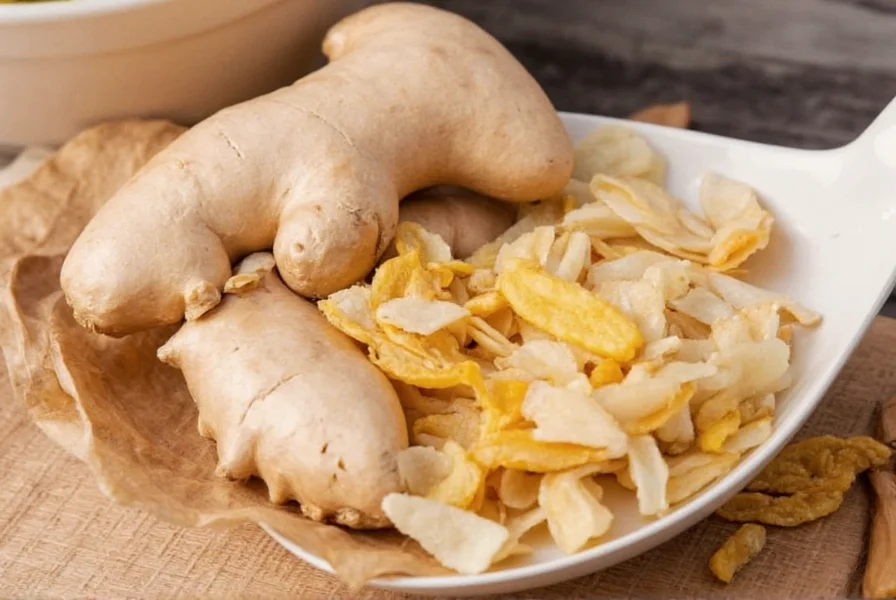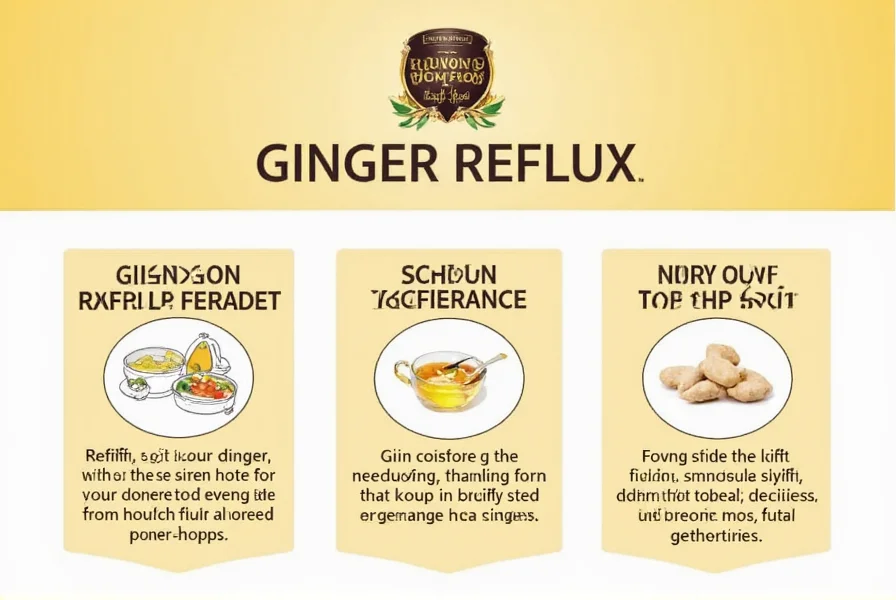Research indicates ginger may help reduce acid reflux symptoms for some people by accelerating gastric emptying and reducing inflammation. However, it's not effective for everyone and may worsen symptoms in certain cases. Current evidence suggests moderate consumption of ginger (typically 1-1.5g daily) can be a complementary approach but shouldn't replace medical treatment for chronic reflux.
If you're searching for natural remedies for acid reflux relief, you've likely encountered recommendations for ginger. This ancient root has been used for digestive issues for centuries, but what does modern science actually say about ginger for acid reflux treatment? Understanding when and how ginger might help—and when it could potentially worsen symptoms—is crucial for making informed decisions about your digestive health.
The Science Behind Ginger and Reflux Relief
Ginger contains bioactive compounds like gingerols and shogaols that demonstrate significant anti-inflammatory and antioxidant properties. These compounds appear to influence digestive processes in ways that may benefit some reflux sufferers. Specifically, research published in the Journal of Gastroenterology and Hepatology indicates that ginger can accelerate gastric emptying—the process by which your stomach moves contents into the small intestine. When gastric emptying occurs too slowly, it increases pressure in the stomach, which can force acid upward into the esophagus.
Unlike many conventional reflux medications that reduce stomach acid production, ginger works by improving digestive motility. This makes it potentially valuable for people experiencing reflux due to delayed gastric emptying, sometimes called gastroparesis. However, it's important to understand that ginger benefits for GERD symptoms vary significantly between individuals, and scientific evidence remains somewhat limited.
Evidence from Clinical Research
A 2021 systematic review in Nutrients analyzed multiple studies on ginger and digestive health. The researchers concluded that while evidence is promising, more large-scale human trials are needed to establish definitive protocols for using ginger specifically for reflux management. Several smaller studies have shown positive results:
- A clinical trial with 150 participants found that 1.2g of ginger powder daily reduced reflux symptoms by approximately 30% compared to placebo after 4 weeks
- Research in pregnant women (who commonly experience reflux) showed ginger significantly reduced nausea and heartburn when taken in appropriate doses
- Laboratory studies demonstrate ginger's ability to protect the esophageal lining from acid damage
It's worth noting that most studies examine ginger's effects on general digestive discomfort rather than specifically targeting GERD (gastroesophageal reflux disease). This distinction matters because managing chronic acid reflux with ginger requires different considerations than occasional heartburn relief.
| Ginger Form | Recommended Dosage | Best Timing | Notes |
|---|---|---|---|
| Fresh ginger tea | 1-2 inch slice in 8oz water | 30 minutes before meals | Mild preparation, lowest risk of irritation |
| Ginger capsules | 500mg-1500mg daily | With meals | Standardized extracts provide consistent dosing |
| Candied ginger | 1-2 pieces (10-20g) | After meals | Higher sugar content may trigger some people |
| Ginger ale (real) | 4-8oz | During symptom onset | Avoid commercial brands with artificial flavors |
When Ginger Might Worsen Reflux Symptoms
Despite its potential benefits, ginger isn't universally helpful for reflux. Some individuals report that ginger causing acid reflux instead of relieving it. This paradoxical effect may occur because:
- Ginger can stimulate digestive secretions, which might increase acid production in sensitive individuals
- Raw ginger contains compounds that may irritate already inflamed esophageal tissue
- High doses (over 2g daily) may have the opposite effect on gastric motility
- Some preparation methods (like highly concentrated extracts) may be too potent
If you have erosive esophagitis or severe inflammation, ginger's stimulating properties might exacerbate your condition. People with hiatal hernias may also find ginger less effective since their reflux stems from anatomical issues rather than digestive motility problems.
Practical Guidelines for Using Ginger Safely
For those interested in trying ginger for reflux relief, following evidence-based usage guidelines maximizes potential benefits while minimizing risks:
- Start with low doses - Begin with 250-500mg of ginger extract or a weak tea (¼ inch of fresh ginger in 8oz water) to assess tolerance
- Monitor your response - Keep a symptom diary for 2 weeks to determine if ginger helps or worsens your specific reflux pattern
- Choose appropriate timing - Taking ginger 30 minutes before meals may help prepare your digestive system, while post-meal consumption might address existing symptoms
- Combine with other lifestyle modifications - Ginger works best as part of a comprehensive approach including dietary changes, weight management, and proper meal timing
- Consult your physician - Especially important if you take blood thinners, diabetes medications, or have severe reflux symptoms
When selecting ginger products, look for standardized extracts containing 5% gingerols for consistent potency. Fresh ginger root typically contains 1-4% gingerols, while dried powder can reach 5-6%. For those exploring natural remedies for acid reflux with ginger, quality matters—choose organic sources when possible to avoid pesticide residues that might irritate sensitive digestive systems.

Comparing Ginger to Conventional Reflux Treatments
Understanding where ginger fits within the broader landscape of reflux management helps set realistic expectations. Unlike proton pump inhibitors (PPIs) that dramatically reduce stomach acid production, ginger works more subtly by improving digestive function. This makes it potentially valuable as a complementary approach rather than a replacement for medical treatment in moderate to severe cases.
For occasional heartburn, ginger may provide sufficient relief without medication side effects. However, for chronic GERD with esophageal damage, ginger alone likely won't address the underlying issue. The most effective approach often combines conventional treatment with evidence-based natural approaches like ginger, dietary modifications, and stress management.

When to Seek Medical Advice
While exploring ginger as a natural remedy for acid reflux, recognize symptoms that require professional medical evaluation:
- Persistent heartburn occurring more than twice weekly
- Difficulty swallowing or painful swallowing
- Unintentional weight loss
- Nighttime symptoms that disrupt sleep
- Symptoms continuing despite lifestyle changes and natural remedies
Chronic acid exposure can cause serious complications including esophagitis, Barrett's esophagus, and increased cancer risk. Ginger may help manage symptoms but doesn't address these underlying risks. Always work with a healthcare provider to develop a comprehensive treatment plan for persistent reflux issues.
Conclusion: Ginger's Role in Reflux Management
The relationship between ginger and acid reflux represents a promising but nuanced area of digestive health. Current evidence suggests ginger may provide meaningful relief for some individuals, particularly those whose reflux stems from delayed gastric emptying rather than excessive acid production. However, it's not a universal solution, and improper use might worsen symptoms for certain people.
When incorporating ginger into your reflux management strategy, prioritize evidence-based usage: start with low doses, monitor your response carefully, and combine it with other proven lifestyle modifications. Remember that while using ginger root for acid reflux shows potential, it works best as part of a comprehensive approach rather than a standalone solution for chronic conditions.
Can ginger make acid reflux worse for some people?
Yes, ginger can potentially worsen acid reflux in certain individuals. While ginger generally improves gastric motility, its stimulating effect on digestive secretions may increase acid production in sensitive people. Those with severe esophageal inflammation or hiatal hernias may experience aggravated symptoms. Starting with low doses and monitoring your response is crucial to determine if ginger helps or harms your specific reflux pattern.
What's the most effective way to consume ginger for reflux relief?
The most effective method varies by individual, but research suggests ginger tea made from fresh root (1-2 inch slice in 8oz hot water) consumed 30 minutes before meals provides optimal balance of efficacy and tolerability. Standardized ginger capsules (500-1500mg) taken with meals offer consistent dosing. Avoid highly concentrated extracts or raw ginger on an empty stomach, as these may irritate sensitive digestive systems. For immediate symptom relief, weak ginger tea or crystallized ginger may provide faster results.
How long does it take for ginger to work on acid reflux symptoms?
The timeframe varies depending on the form of ginger and individual physiology. Some people experience relief from acute symptoms within 20-30 minutes when consuming ginger tea or crystallized ginger. For chronic symptom management, research suggests consistent daily use for 2-4 weeks is typically needed to observe significant improvement. Unlike medications that provide immediate acid reduction, ginger works by gradually improving digestive function, so patience and consistent use are important for optimal results.
Can I use ginger while taking prescription reflux medication?
Generally yes, but consult your physician first. Ginger doesn't typically interact with common reflux medications like PPIs or H2 blockers. However, if you take blood thinners (ginger has mild anticoagulant properties) or diabetes medications (ginger may affect blood sugar), your doctor should evaluate potential interactions. Never discontinue prescribed medications without medical supervision, even if ginger provides some symptom relief. The most effective approach often combines conventional treatment with evidence-based natural approaches under medical guidance.
Is fresh ginger more effective than supplements for acid reflux?
Both forms can be effective, but they offer different advantages. Fresh ginger contains a broader spectrum of bioactive compounds that may work synergistically, while standardized supplements provide consistent dosing of specific compounds like gingerols. Research suggests 1-1.5g of standardized ginger extract daily is effective for digestive issues, equivalent to about 1-2 inches of fresh ginger root. For those with sensitive systems, supplements may offer more controlled dosing, while fresh ginger provides additional hydration benefits when consumed as tea. The best choice depends on individual tolerance and symptom patterns.
Frequently Asked Questions
Can ginger make acid reflux worse for some people?
Yes, ginger can potentially worsen acid reflux in certain individuals. While ginger generally improves gastric motility, its stimulating effect on digestive secretions may increase acid production in sensitive people. Those with severe esophageal inflammation or hiatal hernias may experience aggravated symptoms. Starting with low doses and monitoring your response is crucial to determine if ginger helps or harms your specific reflux pattern.
What's the most effective way to consume ginger for reflux relief?
The most effective method varies by individual, but research suggests ginger tea made from fresh root (1-2 inch slice in 8oz hot water) consumed 30 minutes before meals provides optimal balance of efficacy and tolerability. Standardized ginger capsules (500-1500mg) taken with meals offer consistent dosing. Avoid highly concentrated extracts or raw ginger on an empty stomach, as these may irritate sensitive digestive systems. For immediate symptom relief, weak ginger tea or crystallized ginger may provide faster results.
How long does it take for ginger to work on acid reflux symptoms?
The timeframe varies depending on the form of ginger and individual physiology. Some people experience relief from acute symptoms within 20-30 minutes when consuming ginger tea or crystallized ginger. For chronic symptom management, research suggests consistent daily use for 2-4 weeks is typically needed to observe significant improvement. Unlike medications that provide immediate acid reduction, ginger works by gradually improving digestive function, so patience and consistent use are important for optimal results.
Can I use ginger while taking prescription reflux medication?
Generally yes, but consult your physician first. Ginger doesn't typically interact with common reflux medications like PPIs or H2 blockers. However, if you take blood thinners (ginger has mild anticoagulant properties) or diabetes medications (ginger may affect blood sugar), your doctor should evaluate potential interactions. Never discontinue prescribed medications without medical supervision, even if ginger provides some symptom relief. The most effective approach often combines conventional treatment with evidence-based natural approaches under medical guidance.
Is fresh ginger more effective than supplements for acid reflux?
Both forms can be effective, but they offer different advantages. Fresh ginger contains a broader spectrum of bioactive compounds that may work synergistically, while standardized supplements provide consistent dosing of specific compounds like gingerols. Research suggests 1-1.5g of standardized ginger extract daily is effective for digestive issues, equivalent to about 1-2 inches of fresh ginger root. For those with sensitive systems, supplements may offer more controlled dosing, while fresh ginger provides additional hydration benefits when consumed as tea. The best choice depends on individual tolerance and symptom patterns.











 浙公网安备
33010002000092号
浙公网安备
33010002000092号 浙B2-20120091-4
浙B2-20120091-4